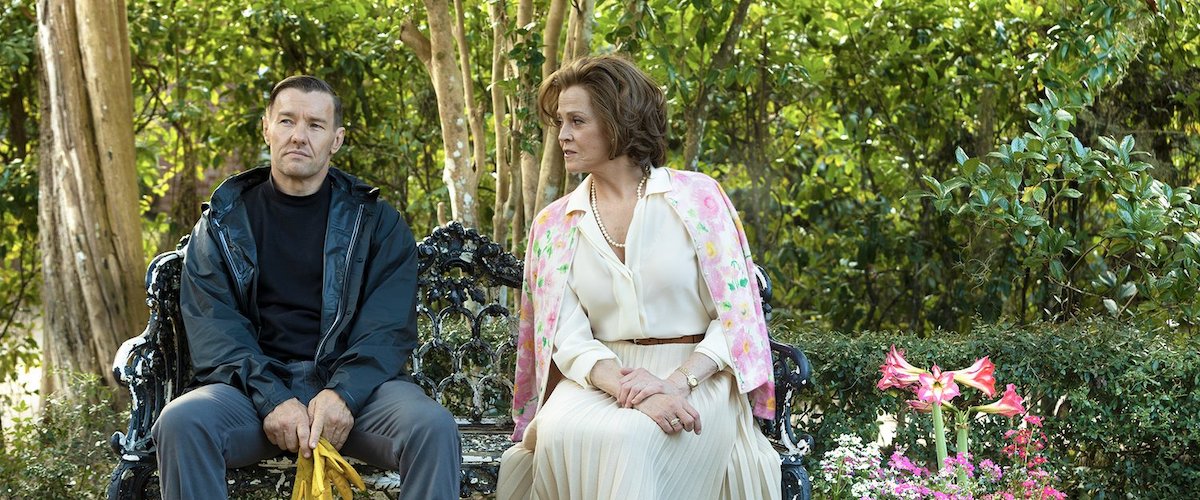
Joel Edgerton and Sigourney Weaver star in Master Gardener. Photo: Supplied.
Men in search of grace in a brutal world is a particular kind of masculine anguish that director Paul Schrader captures remarkably well in Master Gardener.
His latest movie completes a trilogy about this particular kind of male distress, a sense of accountability for sins that may be personal or more universal.
Based on Shrader’s perceptively written original screenplay, Master Gardener follows Narvel Roth (award winner Joel Edgerton, Boy Erased, Zero Dark Thirty), the meticulous horticulturist of Gracewood Gardens, an elegant country house with beautiful extensive gardens.
He is equally devoted to tending the grounds of this beautiful and historic estate and to pandering to his employer, the wealthy dowager Norma Haverhill (three-time Academy Award nominee Sigourney Weaver, Gorillas in the Mist, Aliens).
When Mrs Haverhill demands that he take on her wayward and troubled great-niece Maya Core (Quintessa Swindell, Black Adam, Trinkets) as a new apprentice, chaos enters Narvel’s spartan existence, unlocking dark secrets from a buried violent past that threaten them all.
Like so many of Schrader’s leading men, Narvel is a loner, a sombre gardener with a past rooted in racist hatred. He painstakingly keeps a journal and knows his garden flowers.
One of the first entries explains: “Garden job well done is a visual pleasure. Where there was an unsightly tangle there is a display of what should be there instead of what should not be. Gardening is the manipulation of the natural world. A creation of order, where order is appropriate. The subtle adjustments of disorder where that would be effective.”
While Narvel can methodically plan and control his days, the gardener’s nights are plagued with flashbacks to a different time in his life. Narvel was once a gun for hire for white supremacists and killed various men and women at the orders of the Old Man. Each morning as he dresses and every evening as he undresses, he must bear witness to the racist tattoos that adorn his body, reminding him of his hateful past.
As Maya learns her new craft, she bonds with Narvel, unaware of his hateful past, much to the chagrin of Mrs Haverhill. Narvel attempts to fix the broken bond between the two women, but his plan backfires and Maya retreats into her troubled past life. Narvel becomes desperate to help this seemingly lost soul, even turning to his witness protection officer, Neruda (Esai Morales), for help with a gang of drug dealers that attacked Maya.
As Narvel’s affection for Maya increases, so does Mrs Haverhill’s loathing for her niece. Finally, Mrs Haverhill casts them both out of Gracewood and into the wild, where both Narvel and Maya’s pasts threaten to consume them. Despite the odds, their love grows, but so does Narvel’s fear that Maya will discover his secret and jeopardise not only his, but also Maya’s chance of redemption.
Despite its austerely reasoned exterior, Master Gardener is engaging, cleverly acted, moves at a languid pace, disquieting in mode, is abstract at times, inquisitive, visually appealing and just about luminescent.
In 2019, Schrader was nominated for an Academy Award for Best Original Screenplay for First Reformed, which he also directed. His catalogue of films includes American Gigolo, Cat People, Mishima, Affliction, and The Card Counter.
Master Gardener is a potent tale of a man tormented by his past as a white supremacist gun for hire, which captures the racial tensions of contemporary America. Although not initially envisaged as a trilogy, Master Gardener marks the culmination of a “tryptic of films” that began in 2017 with First Reformed.
Like The Card Counter before it, Master Gardener is a bold new take on Schrader’s ”man in a room” narratives, where a lonely figure, wrestling with his past and hiding behind his day job, waits for something to change. The origins of these stories lie in the early years of Schrader’s film career.
“The character first evolved with Taxi Driver (1976), which was an outgrowth of the existential hero of European fiction,” Schrader said. ”Each chapter of the trilogy concerns men who are facing existential crises – living lonely lives, hiding behind their day jobs – whether as a reverend, a card player or, as in the case of Master Gardener, a horticulturist.”
Although bearing some similar narrative techniques to previous work, Master Gardener detours from what has come before. What leads to an intense story is a central notion of the triad, whether it is sex, race and gender or the character trio of Mrs Haverhill, Narvel and Maya.
Master Gardener is screening now.


